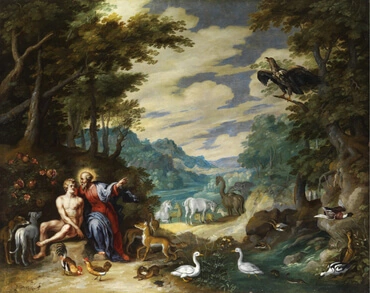1
Ali zmija beše lukava mimo sve zveri poljske, koje stvori Gospod Bog; pa reče ženi: Je li istina da je Bog kazao da ne jedete sa svakog drveta u vrtu?
2
A žena reče zmiji: Mi jedemo rod sa svakog drveta u vrtu;
3
Samo rod s onog drveta usred vrta, kazao je Bog, ne jedite i ne dirajte u nj, da ne umrete.
4
A zmija reče ženi: Nećete vi umreti;
5
Nego zna Bog da će vam se u onaj dan kad okusite s njega otvoriti oči, pa ćete postati kao bogovi i znati šta je dobro šta li zlo.
6
I žena videći da je rod na drvetu dobar za jelo i da ga je milina gledati i da je drvo vrlo drago radi znanja, uzabra rod s njega i okusi, pa dade i mužu svom, te i on okusi.
7
Tada im se otvoriše oči, i videše da su goli; pa spletoše lišća smokovog i načiniše sebi pregače.
8
I začuše glas Gospoda Boga, koji iđaše po vrtu kad zahladi; i sakri se Adam i žena mu ispred Gospoda Boga među drveta u vrtu.
9
A Gospod Bog viknu Adama i reče mu: Gde si?
10
A on reče: Čuh glas Tvoj u vrtu, pa se poplaših, jer sam go, te se sakrih.
11
A Bog reče: Ko ti kaza da si go? Da nisi jeo s onog drveta što sam ti zabranio da ne jedeš s njega?
12
A Adam reče: Žena koju si udružio sa mnom, ona mi dade s drveta, te jedoh.
13
A Gospod Bog reče ženi: Zašto si to učinila? A žena odgovori: Zmija me prevari, te jedoh.
14
Tada reče Gospod Bog zmiji: Kad si to učinila, da si prokleta mimo svako živinče i mimo sve zveri poljske; na trbuhu da se vučeš i prah da jedeš do svog veka.
15
I još mećem neprijateljstvo između tebe i žene i između semena tvog i semena njenog; ono će ti na glavu stajati a ti ćeš ga u petu ujedati.
16
A ženi reče: Tebi ću mnoge muke zadati kad zatrudniš, s mukama ćeš decu rađati, i volja će tvoja stajati pod vlašću muža tvog, i on će ti biti gospodar.
17
Pa onda reče Adamu: Što si poslušao ženu i okusio s drveta s kog sam ti zabranio rekavši da ne jedeš s njega, zemlja da je prokleta s tebe, s mukom ćeš se od nje hraniti do svog veka;
18
Trnje i korov će ti rađati, a ti ćeš jesti zelje poljsko;
19
Sa znojem lica svog ješćeš hleb, dokle se ne vratiš u zemlju od koje si uzet; jer si prah, i u prah ćeš se vratiti.
20
I Adam nadede ženi svojoj ime Jeva, zato što je ona mati svima živima.
21
I načini Gospod Bog Adamu i ženi njegovoj haljine od kože, i obuče ih u njih.
22
I reče Gospod Bog: Eto, čovek posta kao jedan od nas znajući šta je dobro šta li zlo; ali sada da ne pruži ruku svoju i uzbere i s drveta od života, i okusi, te do veka živi.
23
I Gospod Bog izagna ga iz vrta edemskog da radi zemlju, od koje bi uzet;
24
I izagnav čoveka postavi pred vrtom edemskim heruvima s plamenim mačem, koji se vijaše i tamo i amo, da čuva put ka drvetu od života.







